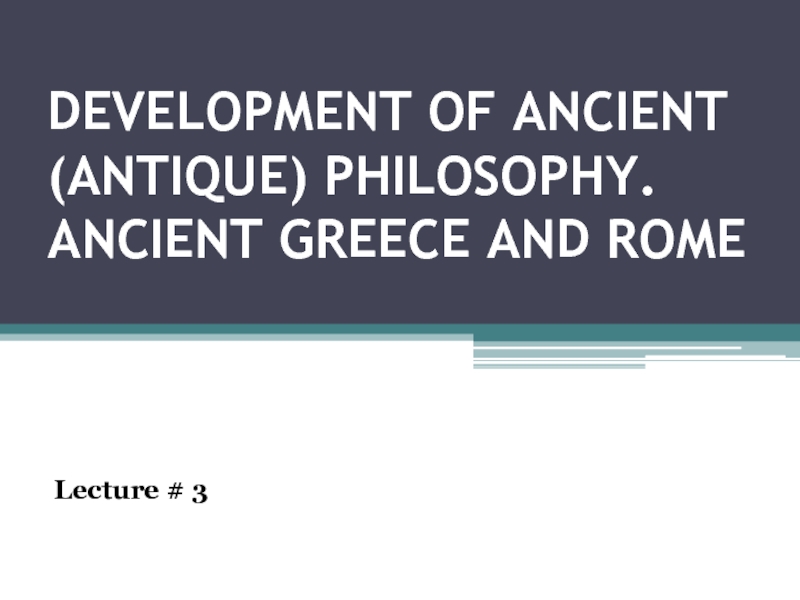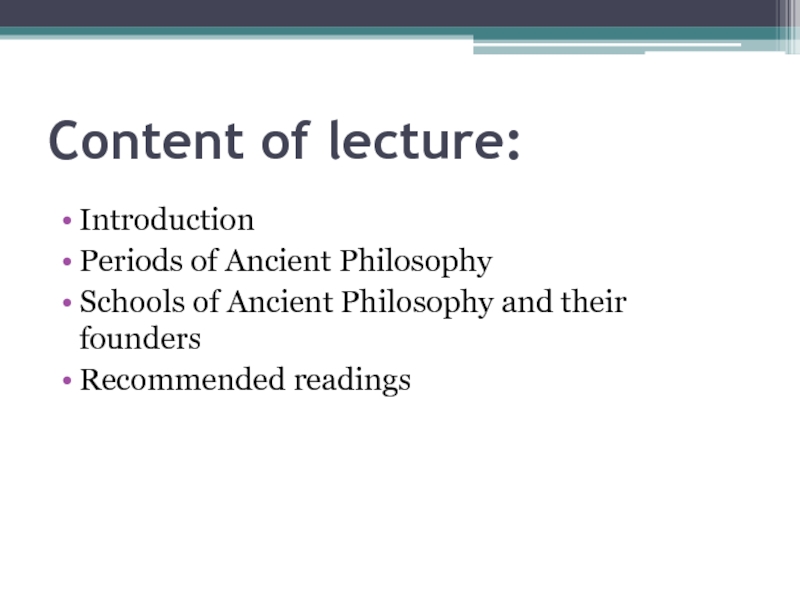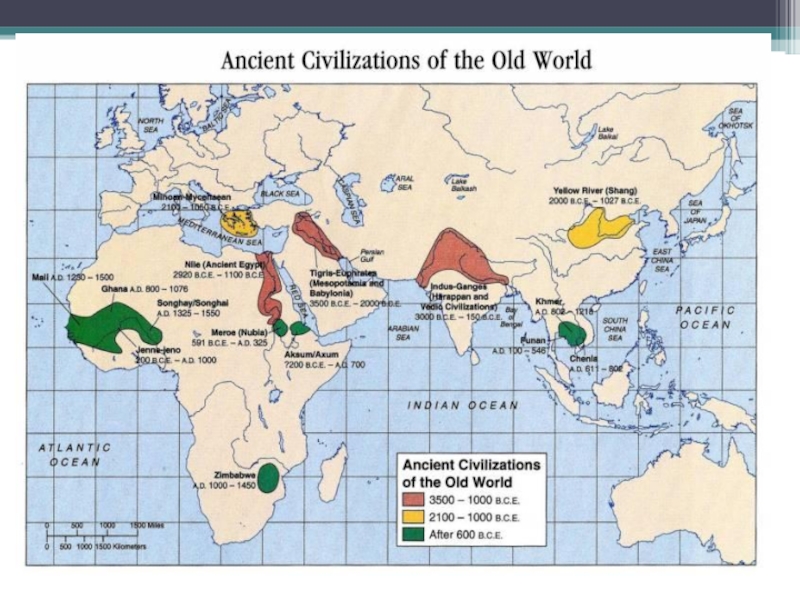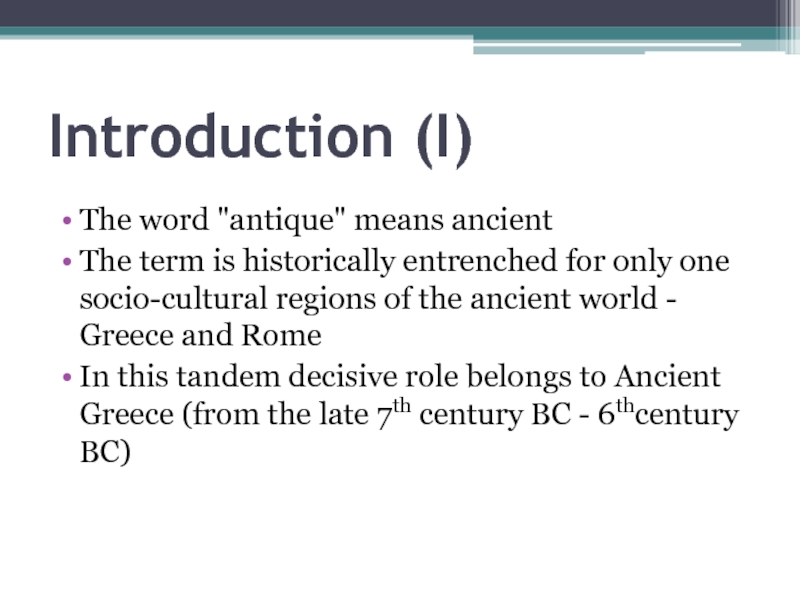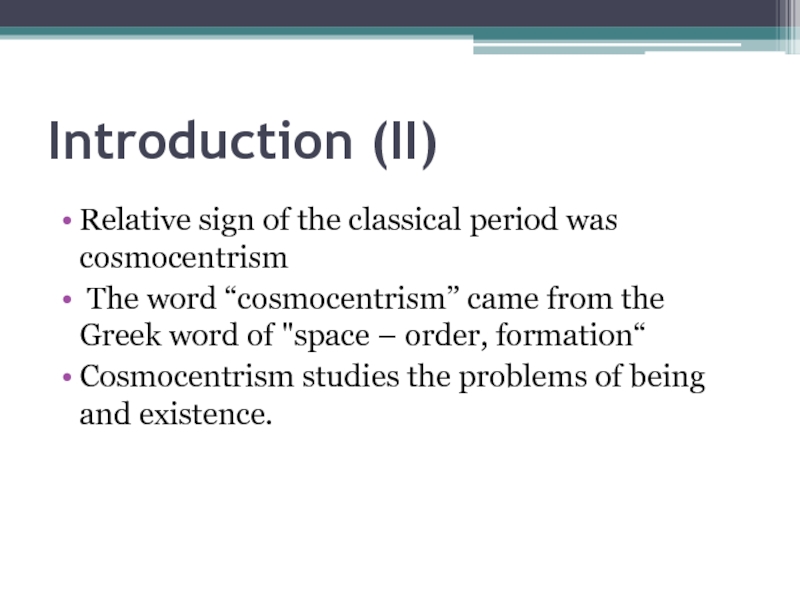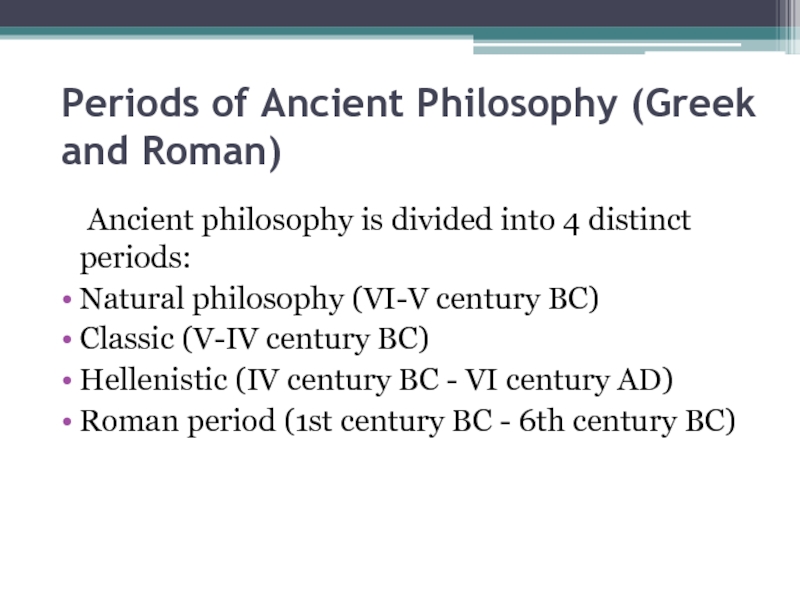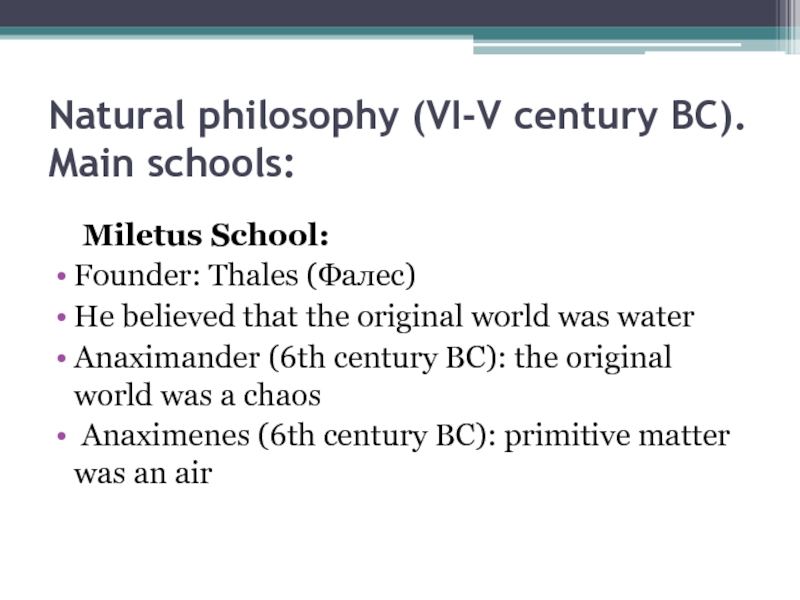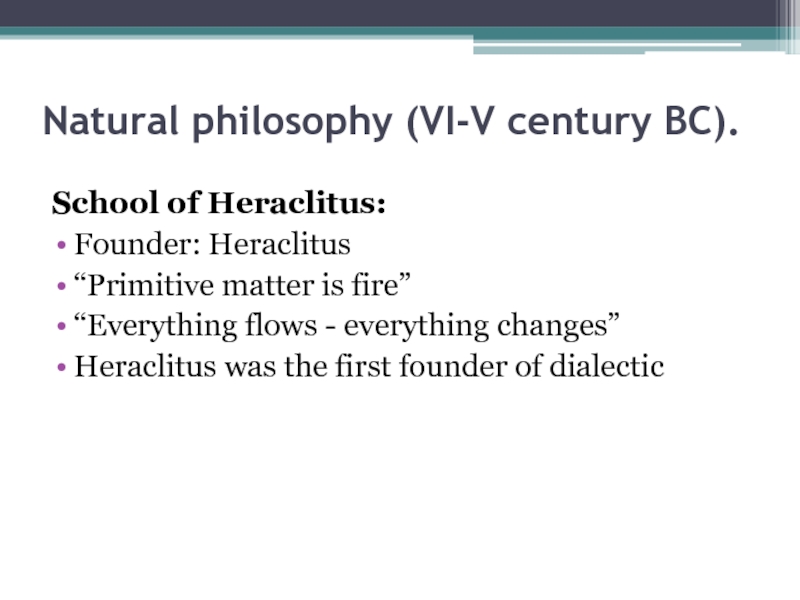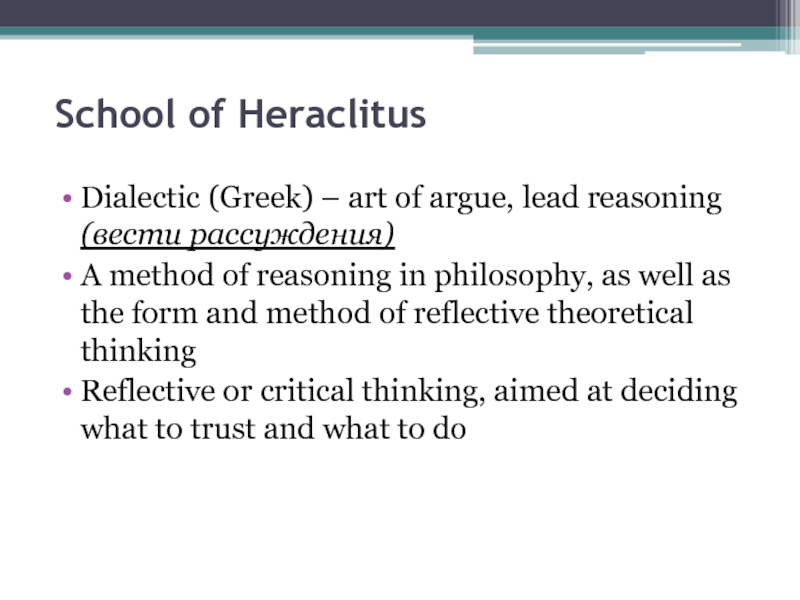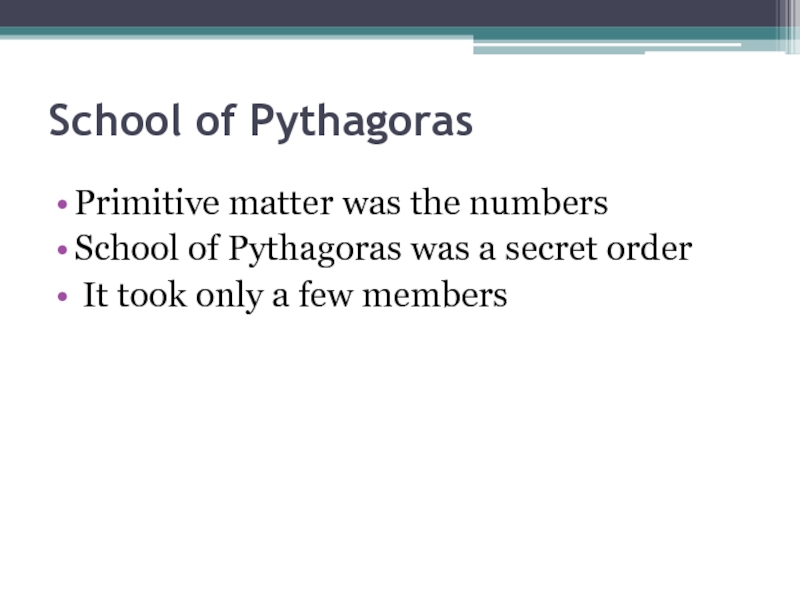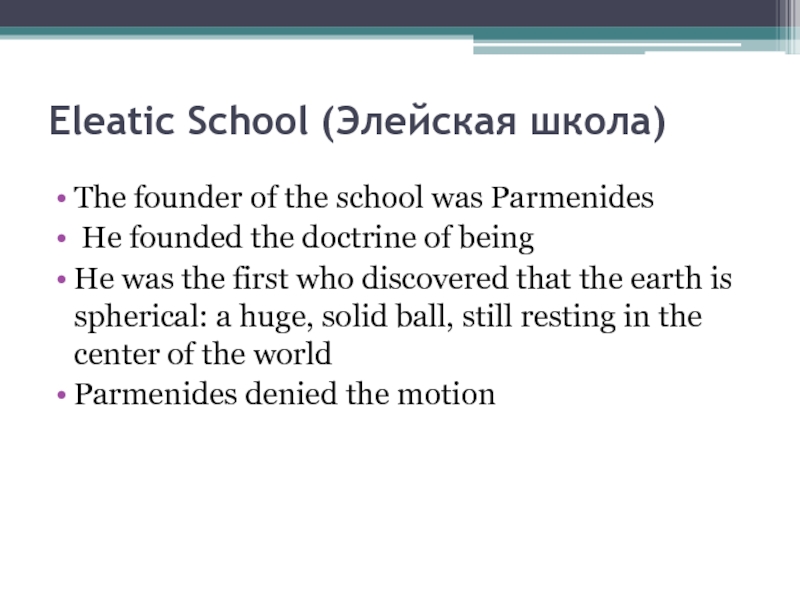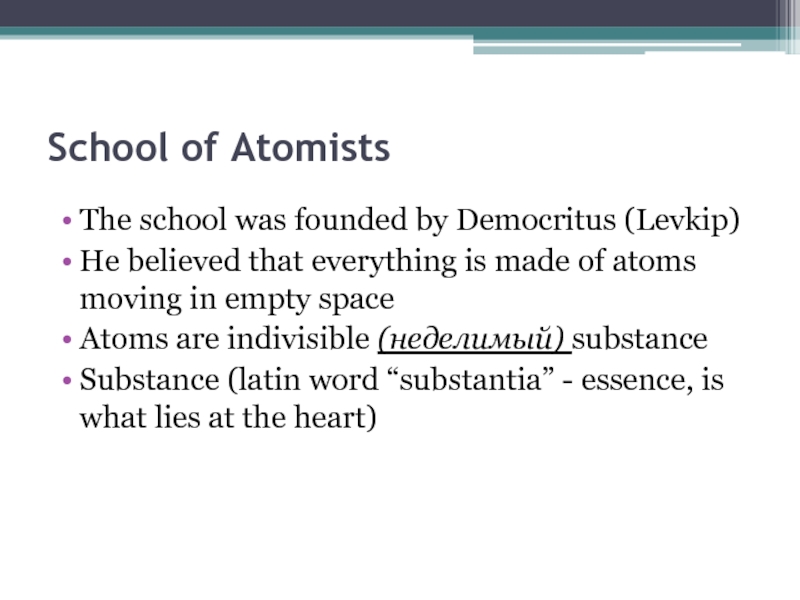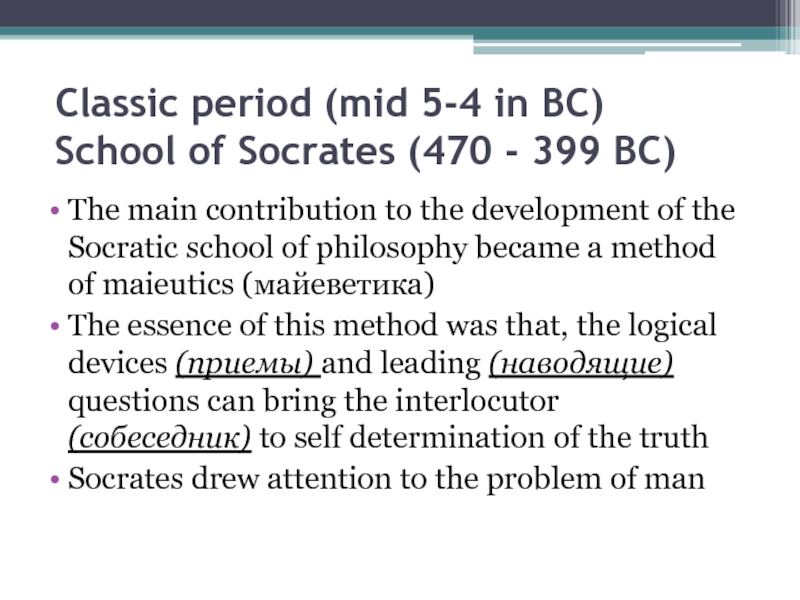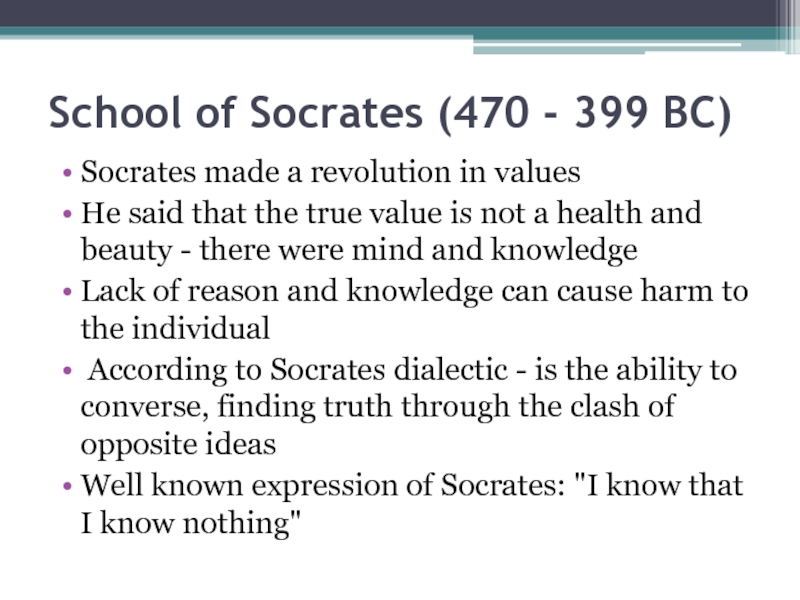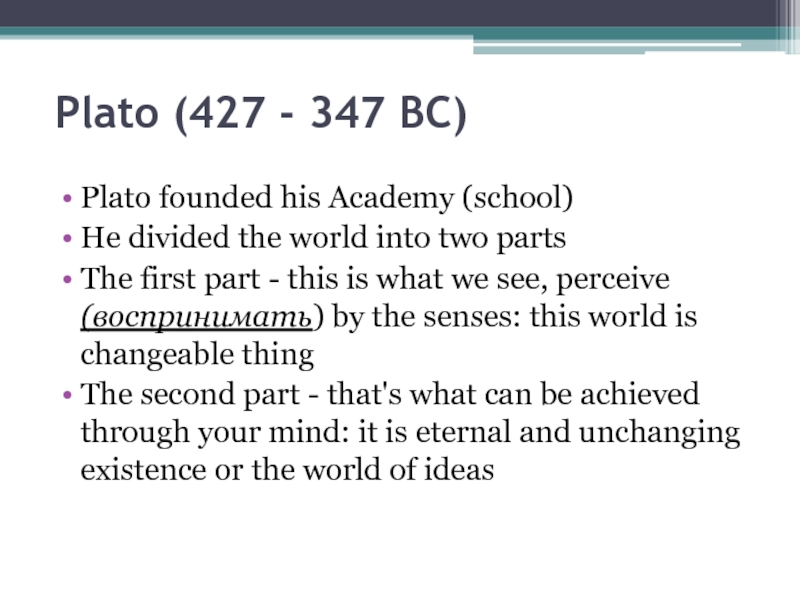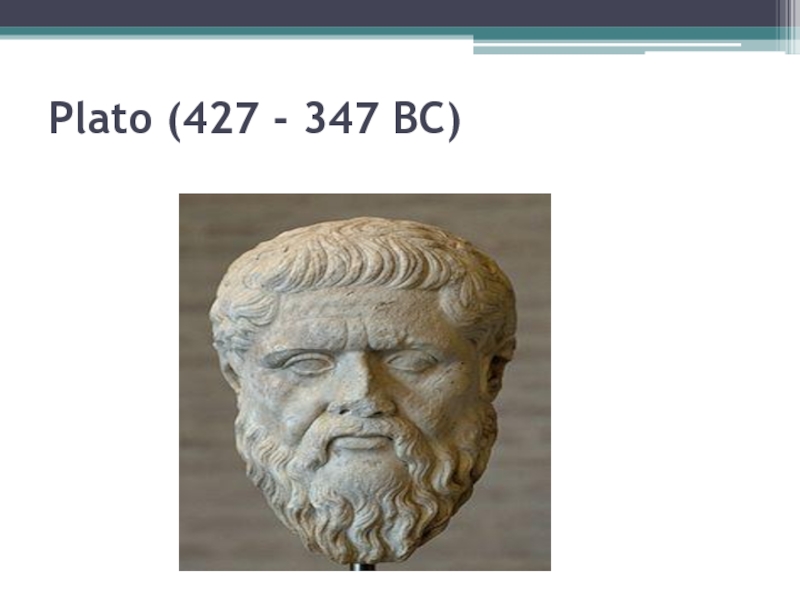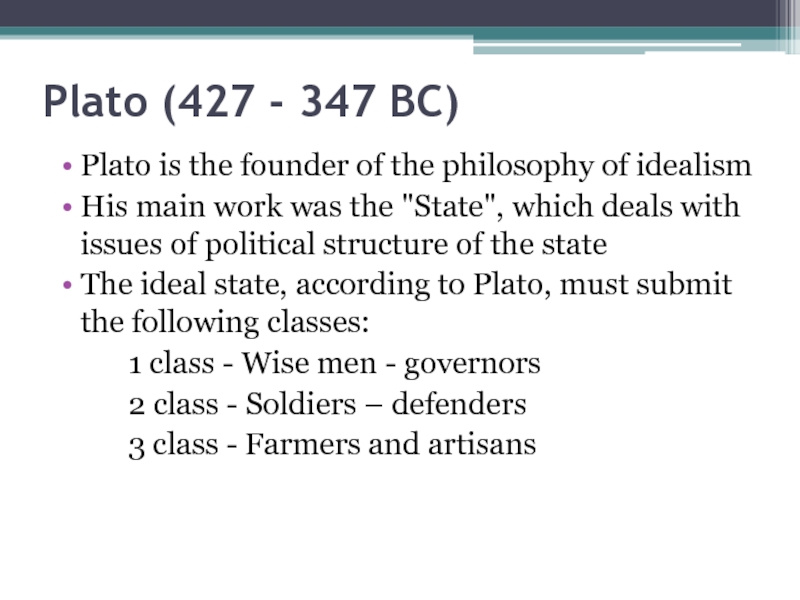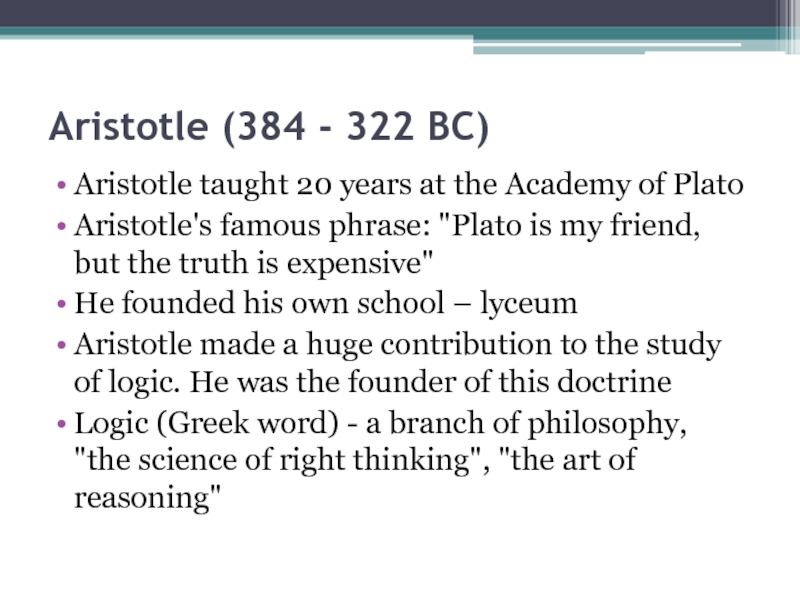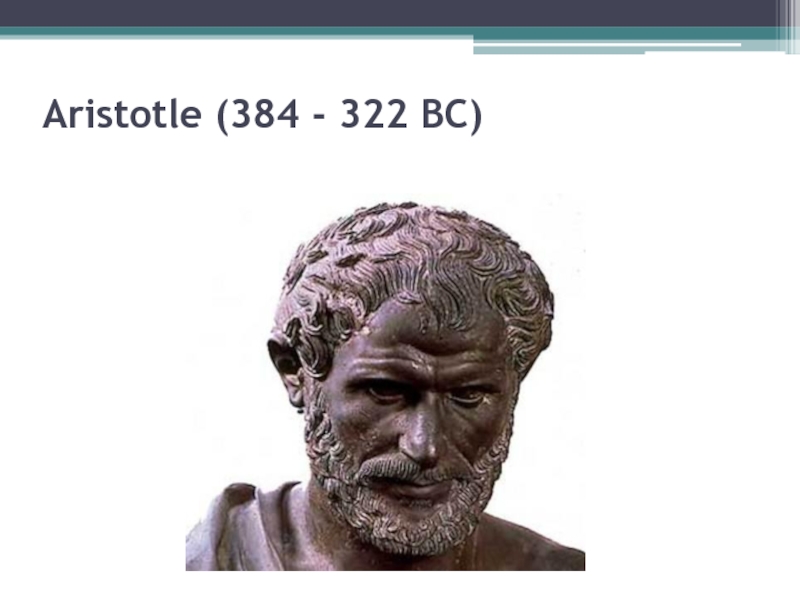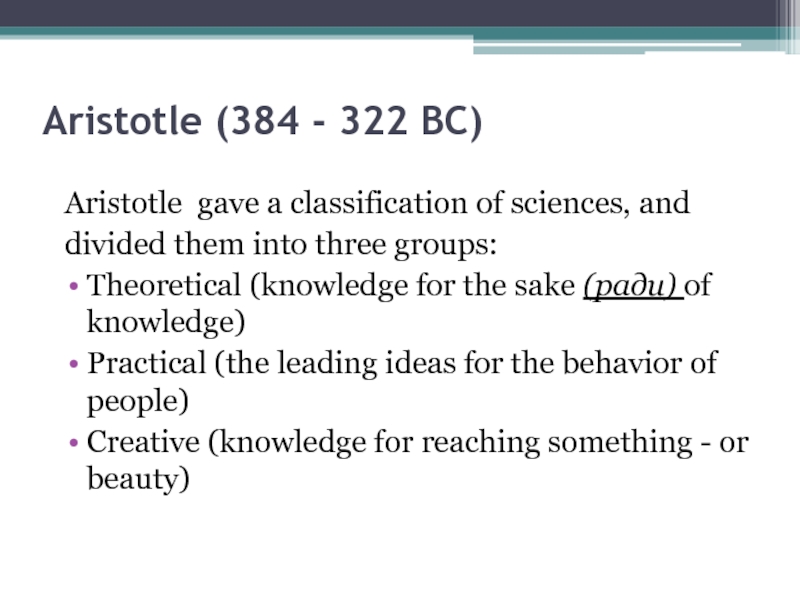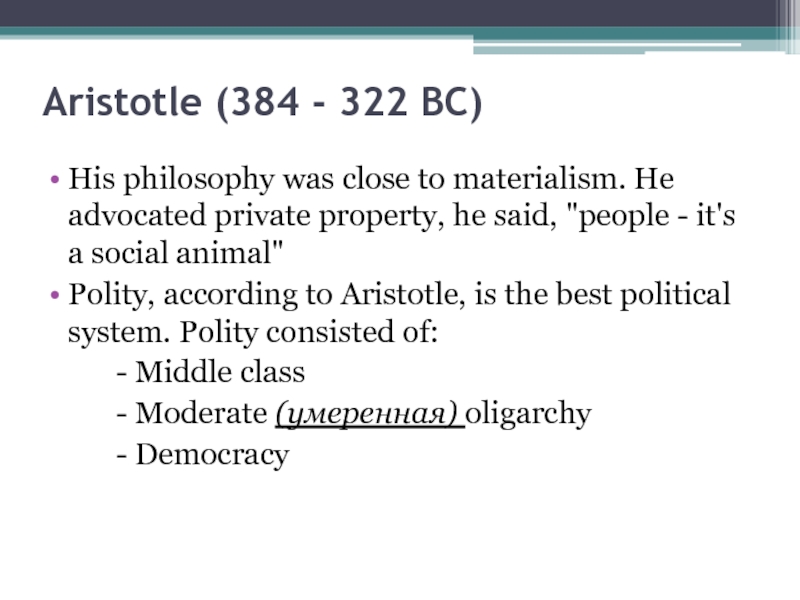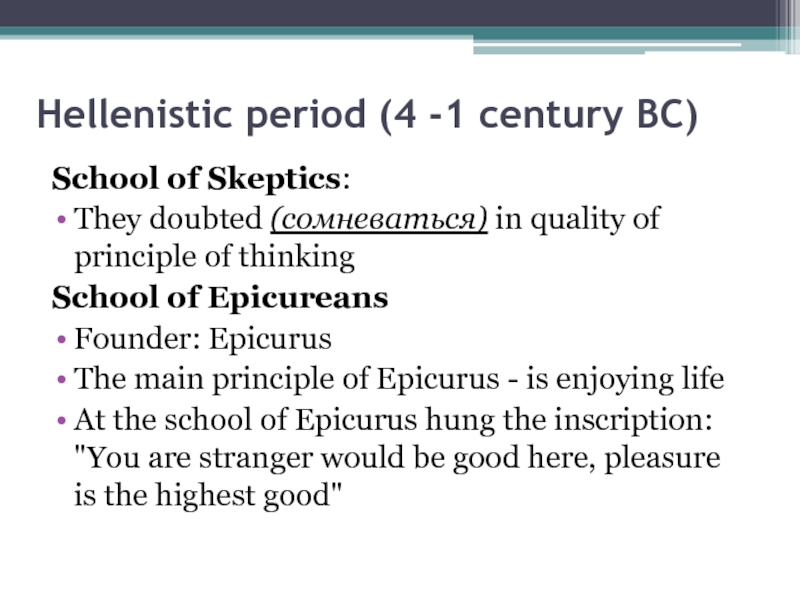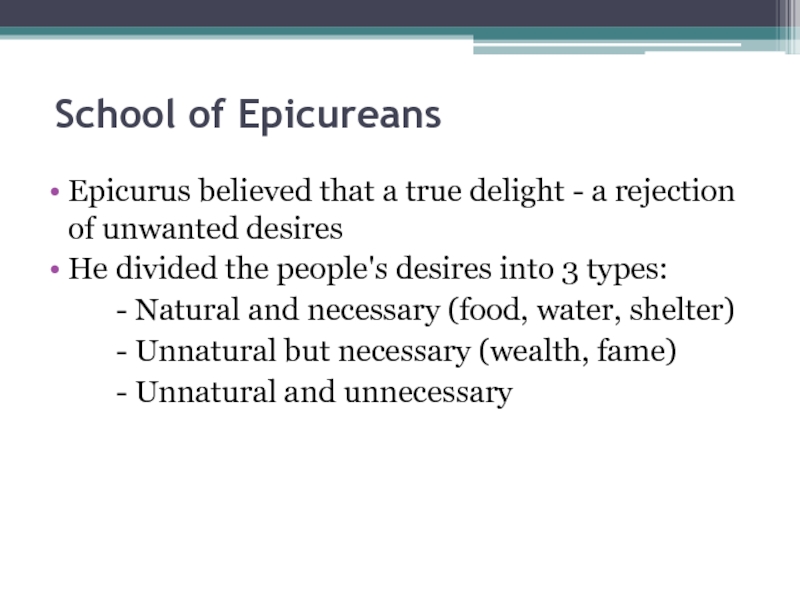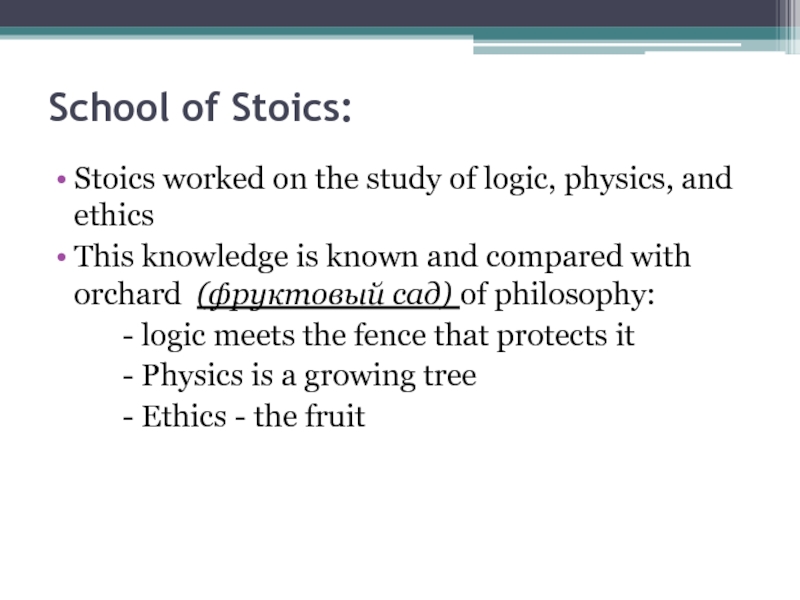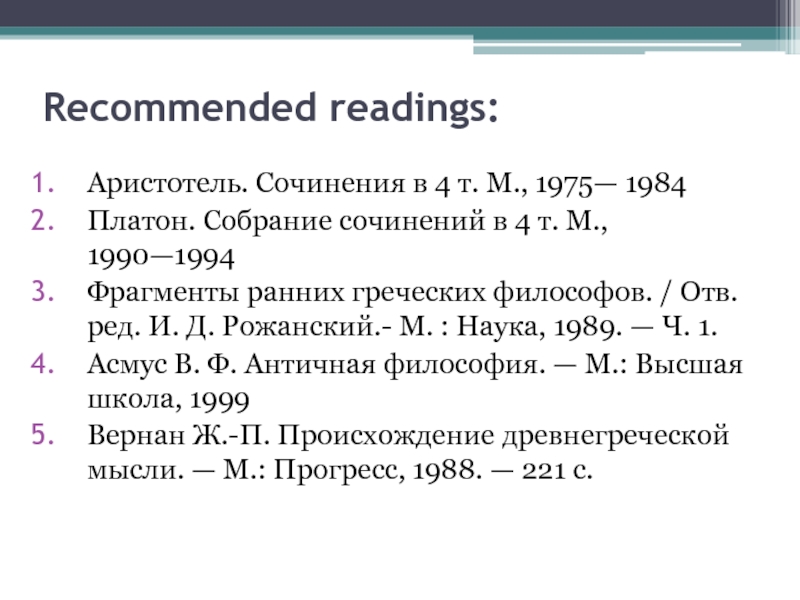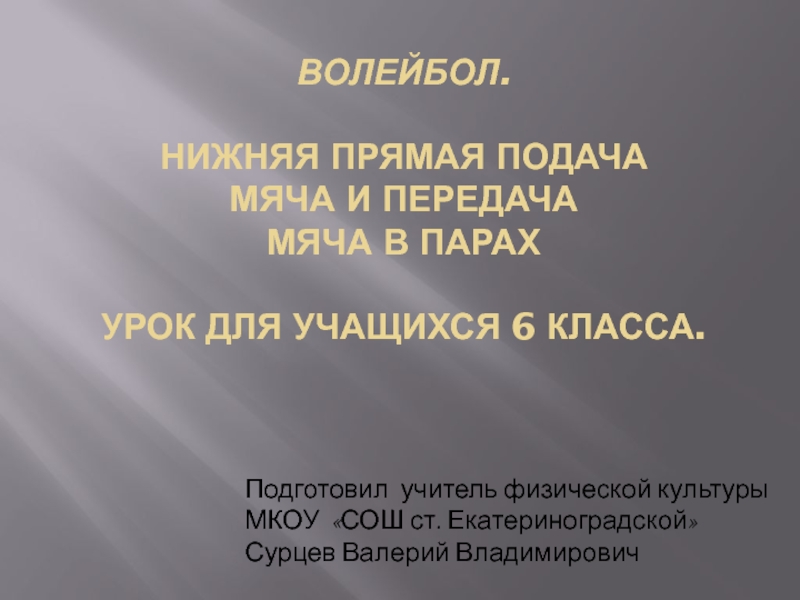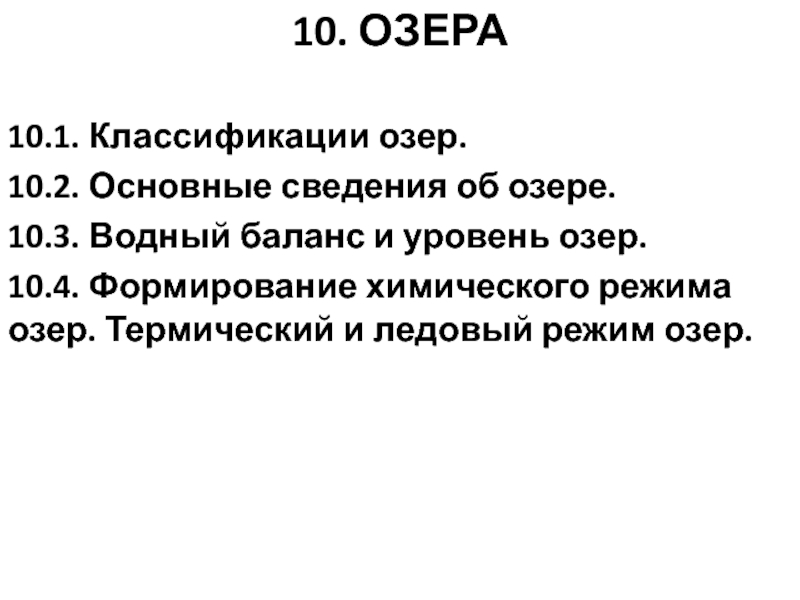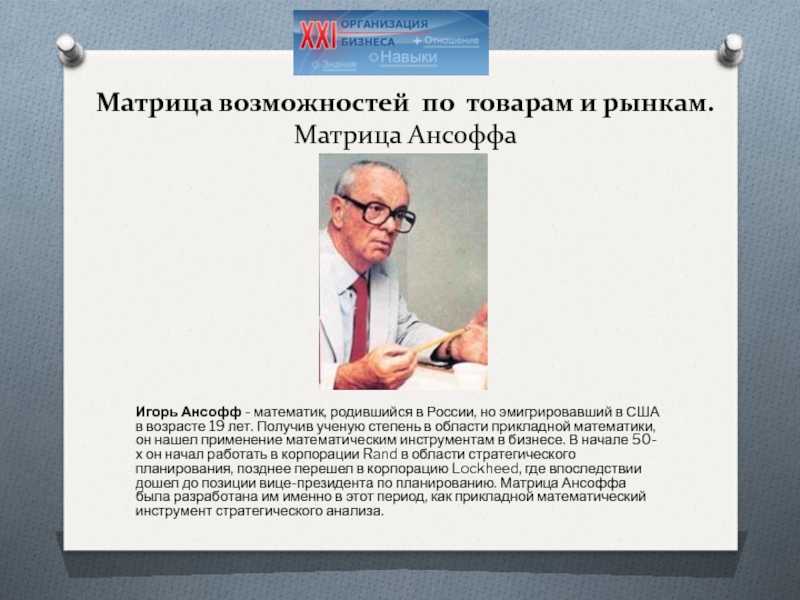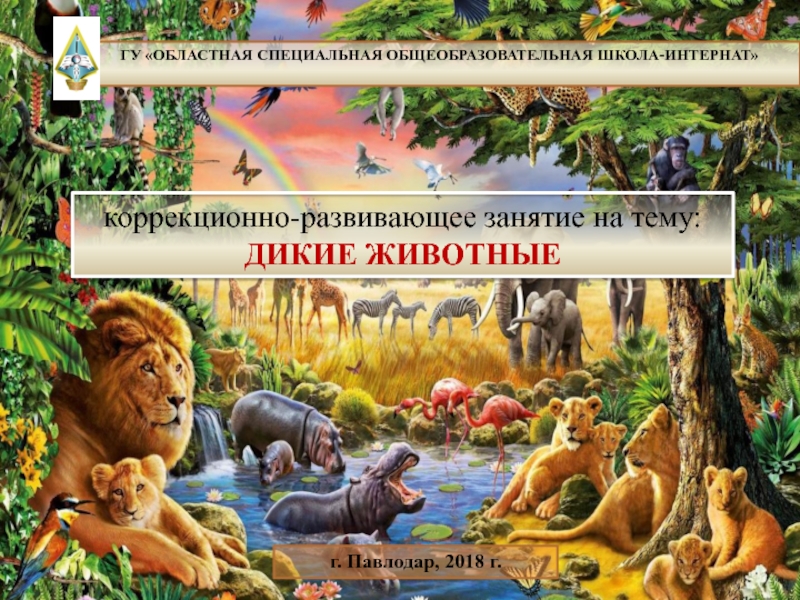Разделы презентаций
- Разное
- Английский язык
- Астрономия
- Алгебра
- Биология
- География
- Геометрия
- Детские презентации
- Информатика
- История
- Литература
- Математика
- Медицина
- Менеджмент
- Музыка
- МХК
- Немецкий язык
- ОБЖ
- Обществознание
- Окружающий мир
- Педагогика
- Русский язык
- Технология
- Физика
- Философия
- Химия
- Шаблоны, картинки для презентаций
- Экология
- Экономика
- Юриспруденция
DEVELOPMENT OF ANCIENT (ANTIQUE) PHILOSOPHY. ANCIENT GREECE AND ROME
Содержание
- 1. DEVELOPMENT OF ANCIENT (ANTIQUE) PHILOSOPHY. ANCIENT GREECE AND ROME
- 2. Content of lecture: IntroductionPeriods of Ancient PhilosophySchools of Ancient Philosophy and their foundersRecommended readings
- 3. Слайд 3
- 4. Introduction (I) The word "antique" means
- 5. Introduction (II) Relative sign of the
- 6. Periods of Ancient Philosophy (Greek and
- 7. Natural philosophy (VI-V century BC). Main
- 8. Natural philosophy (VI-V century BC).
- 9. School of Heraclitus Dialectic (Greek) –
- 10. School of Pythagoras Primitive matter was
- 11. Eleatic School (Элейская школа) The
- 12. School of Atomists The school
- 13. Classic period (mid 5-4 in
- 14. School of Socrates (470 - 399
- 15. Plato (427 - 347 BC) Plato
- 16. Plato (427 - 347 BC)
- 17. Plato (427 - 347 BC)Plato is the
- 18. Aristotle (384 - 322 BC) Aristotle
- 19. Aristotle (384 - 322 BC)
- 20. Aristotle (384 - 322 BC) Aristotle
- 21. Aristotle (384 - 322 BC) His
- 22. Hellenistic period (4 -1 century BC)
- 23. School of Epicureans Epicurus
- 24. School of Stoics: Stoics worked on
- 25. Roman period (1st century BC -
- 26. Recommended readings: Аристотель. Сочинения в 4
- 27. Recommended readings: 6. Мамардашвили М. К. Лекции
- 28. Скачать презентанцию
Content of lecture: IntroductionPeriods of Ancient PhilosophySchools of Ancient Philosophy and their foundersRecommended readings
Слайды и текст этой презентации
Слайд 2
Content of lecture:
Introduction
Periods of Ancient Philosophy
Schools of Ancient Philosophy and
their founders
Слайд 4
Introduction (I)
The word "antique" means ancient
The term is historically entrenched
for only one socio-cultural regions of the ancient world -
Greece and RomeIn this tandem decisive role belongs to Ancient Greece (from the late 7th century BC - 6thcentury BC)
Слайд 5
Introduction (II)
Relative sign of the classical period was cosmocentrism
The
word “cosmocentrism” came from the Greek word of "space –
order, formation“Cosmocentrism studies the problems of being and existence.
Слайд 6
Periods of Ancient Philosophy (Greek and Roman)
Ancient philosophy is divided
into 4 distinct periods:
Natural philosophy (VI-V century BC)
Classic (V-IV century
BC)Hellenistic (IV century BC - VI century AD)
Roman period (1st century BC - 6th century BC)
Слайд 7
Natural philosophy (VI-V century BC). Main schools:
Miletus School:
Founder: Thales
(Фалес)
He believed that the original world was water
Anaximander (6th century
BC): the original world was a chaosAnaximenes (6th century BC): primitive matter was an air
Слайд 8
Natural philosophy (VI-V century BC).
School of Heraclitus:
Founder: Heraclitus
“Primitive matter
is fire”
“Everything flows - everything changes”
Heraclitus was the first founder
of dialecticСлайд 9
School of Heraclitus
Dialectic (Greek) – art of argue, lead reasoning
(вести рассуждения)
A method of reasoning in philosophy, as well as
the form and method of reflective theoretical thinkingReflective or critical thinking, aimed at deciding what to trust and what to do
Слайд 10
School of Pythagoras
Primitive matter was the numbers
School of Pythagoras was
a secret order
It took only a few members
Слайд 11
Eleatic School (Элейская школа)
The founder of the school was
Parmenides
He founded the doctrine of being
He was the first
who discovered that the earth is spherical: a huge, solid ball, still resting in the center of the worldParmenides denied the motion
Слайд 12
School of Atomists
The school was founded by Democritus (Levkip)
He
believed that everything is made of atoms moving in empty
spaceAtoms are indivisible (неделимый) substance
Substance (latin word “substantia” - essence, is what lies at the heart)
Слайд 13 Classic period (mid 5-4 in BC) School of Socrates (470 -
399 BC)
The main contribution to the development of the
Socratic school of philosophy became a method of maieutics (майеветика)The essence of this method was that, the logical devices (приемы) and leading (наводящие) questions can bring the interlocutor (собеседник) to self determination of the truth
Socrates drew attention to the problem of man
Слайд 14
School of Socrates (470 - 399 BC)
Socrates made a
revolution in values
He said that the true value is not
a health and beauty - there were mind and knowledgeLack of reason and knowledge can cause harm to the individual
According to Socrates dialectic - is the ability to converse, finding truth through the clash of opposite ideas
Well known expression of Socrates: "I know that I know nothing"
Слайд 15
Plato (427 - 347 BC)
Plato founded his Academy (school)
He divided
the world into two parts
The first part - this is
what we see, perceive (воспринимать) by the senses: this world is changeable thingThe second part - that's what can be achieved through your mind: it is eternal and unchanging existence or the world of ideas
Слайд 17Plato (427 - 347 BC)
Plato is the founder of the
philosophy of idealism
His main work was the "State", which deals
with issues of political structure of the stateThe ideal state, according to Plato, must submit the following classes:
1 class - Wise men - governors
2 class - Soldiers – defenders
3 class - Farmers and artisans
Слайд 18
Aristotle (384 - 322 BC)
Aristotle taught 20 years at the
Academy of Plato
Aristotle's famous phrase: "Plato is my friend, but
the truth is expensive" He founded his own school – lyceum
Aristotle made a huge contribution to the study of logic. He was the founder of this doctrine
Logic (Greek word) - a branch of philosophy, "the science of right thinking", "the art of reasoning"
Слайд 20
Aristotle (384 - 322 BC)
Aristotle gave a classification of sciences,
and
divided them into three groups:
Theoretical (knowledge for the sake (ради)
of knowledge)Practical (the leading ideas for the behavior of people)
Creative (knowledge for reaching something - or beauty)
Слайд 21
Aristotle (384 - 322 BC)
His philosophy was close to materialism.
He advocated private property, he said, "people - it's a
social animal"Polity, according to Aristotle, is the best political system. Polity consisted of:
- Middle class
- Moderate (умеренная) oligarchy
- Democracy
Слайд 22
Hellenistic period (4 -1 century BC)
School of Skeptics:
They doubted (сомневаться)
in quality of principle of thinking
School of Epicureans
Founder: Epicurus
The main
principle of Epicurus - is enjoying lifeAt the school of Epicurus hung the inscription: "You are stranger would be good here, pleasure is the highest good"
Слайд 23
School of Epicureans
Epicurus believed that a true delight - a
rejection of unwanted desires
He divided the people's desires into 3
types:- Natural and necessary (food, water, shelter)
- Unnatural but necessary (wealth, fame)
- Unnatural and unnecessary
Слайд 24
School of Stoics:
Stoics worked on the study of logic, physics,
and ethics
This knowledge is known and compared with orchard (фруктовый
сад) of philosophy: - logic meets the fence that protects it
- Physics is a growing tree
- Ethics - the fruit
Слайд 25
Roman period (1st century BC - 6th century AD)
This period
is characterized by the proliferation of Skeptics and Stoic philosophy
Its
outstanding representatives were:- Cicero
- Lucretius
- Seneca
- Marcus Aurelius
Слайд 26
Recommended readings:
Аристотель. Сочинения в 4 т. М., 1975— 1984
Платон. Собрание
сочинений в 4 т. М., 1990—1994
Фрагменты ранних греческих философов. /
Отв. ред. И. Д. Рожанский.- М. : Наука, 1989. — Ч. 1.Асмус В. Ф. Античная философия. — М.: Высшая школа, 1999
Вернан Ж.-П. Происхождение древнегреческой мысли. — М.: Прогресс, 1988. — 221 с.
Слайд 27
Recommended readings:
6. Мамардашвили М. К. Лекции по античной философии. — М.: Аграф,
1997.
7. Целлер Э. Очерк истории греческой философии. Перевод С. Л. Франка. — СПб.: Алетейя,
1996.8. Античная философия: Энциклопедический словарь. — М.: Прогресс-Традиция, 2008. — 896 с.
